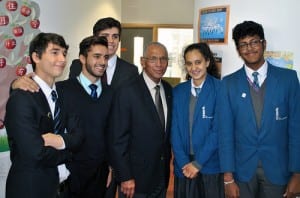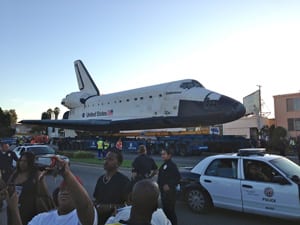Astronaut touches down in Swiss Cottage
By Oli Usher, on 10 October 2014
Charlie Bolden was born in the deep south of the US, during the days of segregation and institutionalised racism. Despite this inauspicious start in life, he went on to a high-flying military career, commanded the Space Shuttle, spent 28 days in orbit and, in 2009, was made head of NASA by President Obama. He is the first African American to hold the position.
During a trip to the UK to meet senior officials in the UK and Italian space agencies, Bolden dropped into the UCL Academy for a few hours to talk to the students and teachers there. The visit was organised by the Mullard Space Science Laboratory at UCL.
He started off with a conventional inspirational speech, full of quotable soundbites – “study hard, work hard, don’t be afraid of failure” – as well as first-hand anecdotes from the four Space Shuttle missions he flew on. (Most memorably, he went on a long and highly entertaining digression about Newton’s laws of motion, and how in microgravity you need to be attached to a computer keyboard if you want to avoid launching yourself across the cabin when you type.)
As he went on, and the students gradually became more and more enthused, more and more hands shot up in the audience.
A quarter of an hour in, any pretence of this being a lecture was off. Instead, it had become a wide-ranging conversation covering everything from what happens if someone falls ill in space (there is someone with basic surgical training on every mission) to whether or not there is wi-fi on the International Space Station (there is).
 Close
Close




